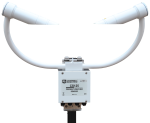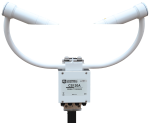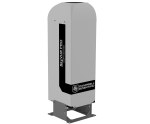
| Services Available |
|---|
Overview
The PWS100 is a laser-based sensor that measures precipitation and visibility by accurately determining the size and velocity of water droplets in the air. It can be used in weather stations in road and airport applications. The PWS100 uses advanced measurement techniques and algorithms to calculate individual precipitation particle type.
For aviation appplications, users can be assured that the PWS100 complies with CAA and ICAO guidance and meets or exceeds all recommendations and specifications. (This includes CAP437, CAP670, and CAP746.) ICAO compliant frangible masts are available for aviation use.
To enhance the PWS100 algorithms, Campbell Scientific recommends adding aCS215-PWS Temperature and Relative Humidity Probe(listed on theOrdering Information pageunder Common Accessories), which will cause the data from the CS215-PWS to be fed directly into the PWS100 precipitation type and visibility algorithms.
Note:Campbell Scientific does not recommend using the PWS100 for marine applications.
Read MoreBenefits and Features
- Unique calibration kit available to calibrate particle size and speed measurement to give confidence in reliable measurement of present weather parameters
- Identifies many precipitation types, including drizzle, rain, snow, hail, and graupel
- Patented four beam, two receiver system directly measures hydrometeor size and velocity
- Reports MOR Visibility in range 0 to 20,000 m with programmable alarm
Images

Detailed Description
天气传感器是一种基于激光的PWS100礼物sensor capable of determining precipitation and visibility parameters for automatic weather stations including road and airport stations. Due to its advanced measurement technique and fuzzy logic algorithms, the PWS100 can determine individual precipitation particle types from accurate size and velocity measurements and the structure of the received signal. Auxiliary measurements of temperature and relative humidity (RH) provide improved particle classification.
The PWS100 consists of a Digital Signal Processor (DSP) housing unit connected to a sensor arm that contains one laser head and two sensor heads. Each sensor head is 20° off axis to the laser unit axis—one in the horizontal plane and the other in the vertical plane. The PWS100 ships with a stainless-steel quick-release clip-on V-bolt mounting bracket that attaches the DSP housing to a mast or pole.
Specifications
| Measuring Area | 40 cm2per light sheet |
| IP Rating | IP 66 (NEMA 4X) |
| Housing Material | Iridite NCP conversion coated aluminium (RoHS compliant) and hard anodized aluminum |
| Communication | RS-232, RS-422, or RS-485 |
| Baud Rate | Selectable from 300 bps to 115.2 kbps |
| Control Unit | Custom DSP Board |
| EMC Compliance | Tested and conforms to BS EN61326:1998 |
| Dimensions | 115 x 70 x 40 cm (45.28 x 27.56 x 15.75 in.) |
| Weight | 8 kg (17.6 lb) |
Power Requirements |
|
| DSP Power | 9 to 24 Vdc (or 9 to 16 Vdc with CS215-PWS Temperature and RH sensor) |
| Current Consumption | 200 mA to 1 A |
| Hood Heater | 24 Vac or dc, 7 A |
Optical |
|
| Laser Source | Near-infrared diode, eye safe Class 1M unit output |
| Peak Wavelength | 830 nm |
| Modulation Frequency | 96 kHz |
| Receivers | Photodiode with band pass filters |
| Spectral Response | Maximum spectral sensitivity at 850 nm, 0.62 A/W (0.6 A/W at 830 nm) |
| Lens Check Light Source | Near-infrared LED |
Measurement |
|
| Particle Size | 0.1 to 30 mm (0.0039 to 1.18 in.) |
| Size Accuracy | ±5%(粒子大于0.3毫米(0.0118英寸。]) |
| Particle Velocity | 0.16 to 30 m/s |
| Velocity Accuracy | ±5% (for particles > 0.3 mm [0.012 in.]) |
| Types of Precipitation Detected | Drizzle, rain, snow grains, snowflakes, hail, ice pellets, graupel, mixed (combination of types above) |
| Rain Rate Intensity Range | 0 to 999.9 mm/h-1 |
| Rainfall Resolution | 0.0001 mm |
| Rain Total Accuracy | Typically ±10% Accuracy figures are for laboratory conditions with reference particles and standards; accuracy will be degraded for windy conditions, frozen precipitation, and very high rainfall rates. |
| Visibility Range | 0 to 20,000 m (0 to 65,616.8 ft) |
| Visibility Accuracy | ±10% to 10,000 m (±10% to 32,808.4 ft) |
| Visibility Measurement Interval | User-selectable from 10 s to 2 h |
| External Sensors | SDI-12 compatible sensors supported (such as the CS215-PWS Temperature and RH Probe) |
| Detection Threshold | > 0.02 mm hr-1 |
| Accumulation Accuracy | ±10% |
Compatibility
Note:The following shows notable compatibility information. It is not a comprehensive list of all compatible or incompatible products.
Data Loggers
| Product | Compatible | Note |
|---|---|---|
| 21X(retired) | ||
| CR10(retired) | ||
| CR1000(retired) | ||
| CR10X(retired) | ||
| CR200X(retired) | ||
| CR206X(retired) | ||
| CR211X(retired) | ||
| CR216X(retired) | ||
| CR23X(retired) | ||
| CR295X(retired) | ||
| CR300 | ||
| CR3000(retired) | ||
| CR310 | ||
| CR500(retired) | ||
| CR5000(retired) | ||
| CR510(retired) | ||
| CR6 | ||
| CR800 | ||
| CR850 | ||
| CR9000(retired) | ||
| CR9000X(retired) |
Documents
Downloads
PWS100 Present Weather Viewing Software v.2.6.1 (32 MB)01-24-2012
Designed to complement the PWS100 the Present Weather Viewer provides a simple yet comprehensive interface showcasing many of the capabilities of the PWS100 whilst providing easy configuration of key sensor features.
常见问题
Number of FAQs related toPWS100:7
Expand AllCollapse All
-
The Present Weather Viewer is available for download from the Downloads section of the PWS100 product page.
-
Yes. For in-situ calibration by the user, usethePWC100(Calibrator for PWS100). There is a separatePWC100 instruction manual.
-
The basic processing current of the PWS100 is <200 mA at 12 V supply. However, the sensor has two levels of heating available. One set of heaters—known as the dew heaters—prevents condensation on the main lenses of the sensor. When these sensors turn on, the current usage increases to approximately 500 mA at 12 V. A current drain of 1 A is the worst case scenario if the input supply to the sensor drops to the minimum of approximately 9 V (the current drain increasing at lower voltages).
By default, the dew heaters turn on all the time and the main hood heaters are off. The dew heaters can be turned off by the user.
The main hood heaters run from a separate power supply and consume 7 A at 24 V when fully on. The main hood heaters only need to be used when icing conditions are likely.
-
The PWS100 measures visibility by the amount of light that scatters off the particles in the sensing volume, and thus, it cannot measure visibility reduction because of absorption. However, because reduction of visibility by airborne particles is dominated by the scattering effect, the PWS100 is able to measure reduced visibility because of sand, dust, and smoke. The value, however, is less accurate and reads slightly higher for blowing dust, sand, or smoke than for precipitation.
-
Unless the rain gage is poorly sited, the PWS100, similar to most sensors of this type, is less accurate measuring precipitation accumulation than a conventional rain gage.
The PWS100, because of its high sensitivity, is more accurate at detecting the start, end, and totals of very fine rainfall events. In addition, the PWS100 does not experience the evaporation issues that a rain gage does.
-
The Present Weather Viewer does not have a save function for the data. The software is designed as a tool to view current data coming from the fields included in the default message of the PWS100. The Present Weather Viewer can also be used to configure the sensor and access the built-in menu system.
To read, store, and collect data, connect the PWS100 to one of the data loggers or query the sensor directly.
-
The PWS100 measures the size and velocity of particles in the air. It can provide precipitation rate and water equivalent accumulation, but it is primarily used to report present weather codes, as defined by the World Meteorological Organization and National Weather Service, and particle size and velocity distributions. The PWS100 cannot measure snow depth, as it identifies water droplets in air.
Case Studies
The Channel Tunnel (or Chunnel) connects the United Kingdom with France. It is actually a......read more
Privacy Policy Update
We've updated our privacy policy.Learn More



